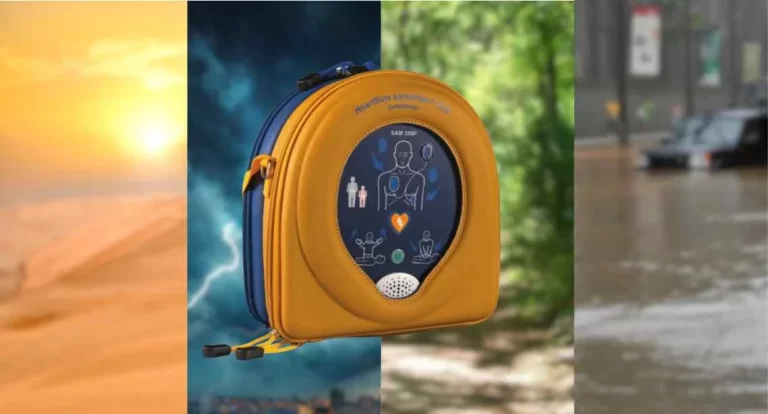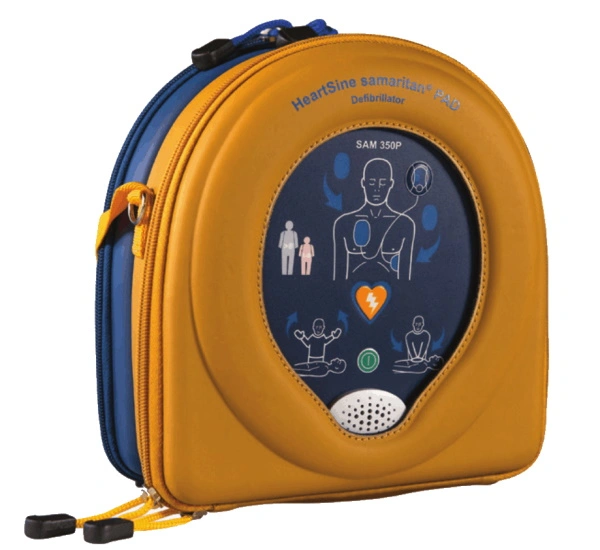Can a Defibrillator Kill You?

Updated 16/07/2024 to incorporate previous article on related topic.
When it comes to life-saving devices, few are as well-known as the defibrillator. These powerful machines are designed to help people whose hearts have stopped beating properly, giving them a chance at survival. But with such a strong electrical shock involved, it’s natural to wonder: can a defibrillator actually kill you? Let’s dive into this question and separate fact from fiction.
How Does a Defibrillator Work?
First, let’s talk about how a defibrillator works. When someone’s heart stops beating correctly, it’s often because the heart muscle is quivering or shaking instead of pumping blood like it should. This is called ventricular fibrillation. A defibrillator uses a strong electrical shock to stop the quivering and give the heart a chance to start beating normally again.
The Shock Factor
Now, about that powerful shock. Defibrillators deliver a lot of electricity to the body in a short amount of time.. So, it’s understandable to worry that such a strong jolt could be dangerous.
But here’s the thing: the shock from a defibrillator is very brief, lasting only a fraction of a second. While it might seem like a lot of electricity, the short duration of the shock means that it’s unlikely to cause harm to a person’s body. Also, it’s a controlled shock. It’s not random but specifically targeted to run through the heart.
Another important thing to consider is: what happens if you do nothing. If a person has had a cardiac arrest, without a shock they will die. So you don’t need to worry about potential issues from a shock. They far outweigh the downsides.
So……. can it……
Mate, why are you googling something like that? I hope you’re doing alright and this is just out of curiosity rather than anything more concerning. But if you are struggling with dark thoughts, please don’t hesitate to reach out to Beyond Blue on 1300 22 4636 or another support service for help. Your life is precious, and there are always people who want to listen without judgment. With that said, I understand the intrigue behind wondering if using a defibrillator on the head could be lethal. I’m sure we’ve all googled something crazy in our lifetime.

Manual Defibrillators in Hospitals
A manual defibrillator like those used in hospitals by trained medical staff could theoretically be used on the head in a potentially fatal way. These powerful devices send a concentrated electrical charge designed to stop fibrillation in the heart muscle. Applying that same jolt directly to the brain would likely prove catastrophic.
Automated External Defibrillators (AEDs)
But let’s be very clear here – the automated external defibrillators (AEDs) designed for public use have numerous safeguards in place to prevent this kind of misuse. These life-saving devices have smart sensor technology that determines if a shock is actually required and beneficial based on the patient’s cardiac rhythm. They simply will not deliver a shock unless they detect a shockable heart arrhythmia like ventricular fibrillation.
Foolproof Design
So no, you don’t need to worry about an AED randomly electrocuting you if the pads get misplaced on your head. They’re not going to just start shocking without detecting a life-threatening heart condition first. That being said, please don’t go around sticking the pads to your head – that would just be an unnecessary misuse of the device!
Built-In Safety
At the end of the day, AEDs are incredibly intelligent safety devices designed with multiple redundancies and failsafes. While improper use of a manual defibrillator could potentially cause harm, the automated ones in public places are essentially foolproof when it comes to accidentally delivering shocks.
Life-Saving Technology
Their sole function is to restart a heart that has stopped pumping blood due to a cardiac emergency. Using them properly, and only in those life-threatening situations, is what saves lives every day across Australia and beyond. Unless you’re actually having a heart attack, there’s no need to worry about freak defibrillator accidents. Just be grateful we have access to these modern marvels of technology
But you might wonder, what if I accidentally shock someone who doesn’t need it? Or what if i were to put defibrillator pads on a conscious person in the wrong place (like michael did in the office), such as the head can a defibrillator kill you?

Defibrillators have sensors that determine the hearts rhythm and won’t give a shock unless it’s needed. That means you can feel safe knowing you wont accidentally shock a conscious person.
When it comes to putting defibrillator pads somewhere they shouldn’t go as a joke, please remember this is a medical device that shouldn’t be messed around with. There can be issues. Pads are costly, and it would be a shame to waste them for a lark.
Using a Defibrillator Safely
Here’s some good news. untrained bystanders who are guided by the machine’s clear, step-by-step instructions.
Modern defibrillators, like the automated external defibrillator (AED), are incredibly user-friendly and will only deliver a shock if it detects that the person’s heart is in a shockable rhythm.
When a defibrillator is used properly, the risk of injury or death to the person receiving the shock is extremely low.
In fact, the greater danger lies in not using a defibrillator when someone is experiencing cardiac arrest. Every minute that passes without defibrillation reduces the chances of survival by about 10%.
The Bottom Line
So, can a defibrillator kill you? The short answer is no, These devices are designed to save lives, not endanger them. The strong electrical shock delivered by a defibrillator is intended to restart a heart that has stopped beating effectively, and the risk of injury from the shock itself is very low.
Of course, as with any medical device, it’s crucial to use a defibrillator correctly and follow the device’s clear instructions You can do what really matters: giving someone a fighting chance at survival.
Remember, when it comes to cardiac arrest, time is of the essence. Having a defibrillator on hand and being prepared to use it can make all the difference in an emergency situation. So, don’t let the fear of the unknown stop you from potentially saving a life. Educate yourself, familiarize yourself with how defibrillators work, and be ready to step in and help if the need arises.
We’d like to encourage you to learn more about defibrillators and their functions. Read our article to understand them better.




